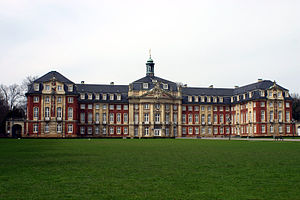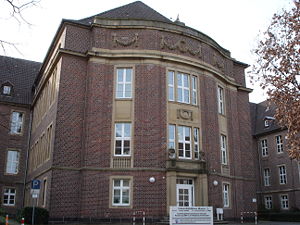- University of Münster
-
Westphalian Wilhelms-University of Münster Westfälische Wilhelms-Universität Münster 
The Schloss: the centre of administration and the symbol of the university.Established April 16, 1780 Type Public university Chancellor Dr. Stefan Schwartze Rector Prof. Dr. Ursula Nelles Admin. staff 13,000 (As of 2004[update]) Students 40,000 (As of 2004[update]) Location Münster, Germany Campus Urban, 285 buildings (2003), yearly expenses ~ 1 billion US dollars Website http://www.uni-muenster.de/en/ 
The University of Münster (German: Westfälische Wilhelms-Universität Münster, WWU) is a public university located in the city of Münster, North Rhine-Westphalia in Germany. The WWU is part of the Deutsche Forschungsgemeinschaft, a society of Germany's leading research universities. The WWU has also been successful in the German "Excellence Initiative".
The WWU is the leading university in Germany in terms of CEO alumni in Top 500 companies.[1]
With more than 40,000 students and over 130 fields of study it is Germany's third largest university and one of the foremost centers of German intellectual life. The university offers a wide range of units (e.g. Business, Geography, IT, Mathematics and many more) and several courses in English (e.g. PhD/Doctorate, Masters in Geoinformatics, Geospational Technologies or Information Systems).
The university is associated with nine Gottfried Wilhelm Leibniz Prize (most prestigious as well as most-funding prize in Europe), two Nobel prize (one former student and one professor) and one Fields Medal winners as professors and many more from former students.
Contents
History
The University has its roots in the Jesuiten-Kolleg Münster, which was founded in 1588. But today's University of Münster was founded in 1780 with four faculties: Law, Health Science (Medicine), Philosophy and Theology. The ceremony of constitution was performed by Franz Freiherr von Fürstenberg. In 1805 the university was extended to the Prussian University of Westphalia. It got its current name from Emperor Wilhelm II in 1907: Westfälische Wilhelms-Universität (WWU).
Organization
- Faculty of Protestant Theology
- Faculty of Catholic Theology
- Faculty of Law
- Faculty of Economics (Muenster School of Business Administration and Economics)
- Faculty of Health Science (Medicine and Dental Medicine)
- Faculty of Philosophy
- Faculty of Educational and Social Science
- Faculty of Psychology and Sport Science
- Faculty of History/Philosophy
- Faculty of Philology
- Faculty of Natural Science and Mathematics
- Faculty of Mathematics and Computer Science
- Faculty of Physics
- Faculty of Chemistry and Pharmacy
- Faculty of Biology
- Faculty of Earth Science
- Faculty of Music (Musikhochschule Münster)
Points of interest
- Botanischer Garten Münster, the university's historic botanical garden
Student life
The University of Münster offers a very active student life. Student organisations such as AIESEC, AEGEE, MOVE, MTP and many more are well represented and usually have a high number of members. A wide range of language courses is also offered (UNIcert). The city of Münster itself has a very active night life with over 1.000 bars, discothèques and clubs and the city of the Peace of Westphalia also has - of course - a very rich cultural life.
Notable alumni
See also List of Westphalian Wilhelms-University Münster people.
Students
- Wolfgang Clement, Politician
- Johannes Georg Bednorz, Nobel Prize winner (1987)
- Dr. Andreas Raymond Dombret, Münster School of Business Administration and Economics, Member of the Executive Board of the Deutsche Bundesbank[2]
- Prof. Dr. Gerd Faltings, Mathematician, Fields Medal
- Prof. Dr. Dieter Fenske, Chemist
- Birgit Fischer, Politician
- Kai Diekmann, Chief Editor of "Bild", Europe's largest newspaper (3.5 million copies)
- Dr. August Hanning, President of the Bundesnachrichtendienst
- Dr. Dr. Gustav Heinemann, Politician, former President of Germany
- Prof. Dr. Dr. h.c. mult. Friedrich Hirzebruch, Mathematician
- Prof. Dr. Thomas Hoeren, intellectual property judge and lawyer
- Jens Lehmann, footballer (goal keeper) of the German Football Team
- Ursula von der Leyen, Doctor, Federal Minister of Labour and Social Affairs, MP in the Deutscher Bundestag
- Niklas Luhmann, Sociologist
- Ulrike Marie Meinhof, member of the Red Army Faction
- Gilmar Mendes President of Brazilian Supreme Federal Court
- Frank Mattern, Münster School of Business Administration and Economics, Director Germany McKinsey
- Dr. Thomas Middelhoff, Board of Directors Bertelsmann
- Prof. Dr. Georg Milbradt, Minister-President of Saxony
- Walter Momper, Politician
- Ruprecht Polenz, Politician
- Dr. Kurt Schumacher, Politician
- Dr. h.c. Rudolf Seiters, Politician
- Prof. Dr. Hans-Werner Sinn, student, President of the leading Institution for Economic Research (Instituts für Wirtschaftsforschung, IFO).
- Prof. Dr. Dr. h.c. Karl Stein, Mathematician
- Prof. Dr. Dr. h.c.mult. Hans Tietmeyer, Economist
- Klaus Töpfer, UNO-Commissar
- Ernst Tugendhat, Philosopher
- Prof. Dr. Karl Weierstrass, Mathematician
- Harald Weinrich, Classical Scholar
- Arthur Wieferich, Mathematician
- Heinrich August Winkler, Historian
- Dr. Klaus Zumwinkel, former Board of Directors Deutsche Post World Net
University lecturers
- Pope Benedict XVI: Prof. Dr. Dr. h. c. mult. Joseph Kardinal Ratzinger
- Prof. Dr. Wilhelm Ackermann, Mathematician
- Prof. Dr. Kurt Aland, Theologian
- Prof. Dr. Karl Barth, Theologian
- Prof. Dr. Hans Blumenberg, (1920–1996) Philosopher
- Prof. Dr. Max Dehn, (1878–1952) Mathematician
- Prof. Dr. Gerhard Domagk, Nobel Prize in Medicine (1939)
- Prof. Dr. Heinz Gollwitzer, (1917–1999) Historian
- Prof. Dr. Bernhard Großfeld, International Business Law
- Prof. Dr. Klaus Hildebrand, Historian
- Prof. Dr. Paul Kevenhörster, Political scientist
- Prof. Dr. Wilhelm Killing, (1847–1923) Mathematician
- Prof. Dr. Paul Kirchhof, Jurist
- Prof. Dr. Dr. Johann Baptist Metz, Theologian
- Prof. Dr. Wolfgang Metzger, Psychologist
- Prof. Dr. Alfred Müller-Armack (1901–1978), Economist, Inventor of the Social Market Economy
- Prof. Dr. Friedrich Münzer, Classical Scholar
- Prof. Dr. Josef Pieper (1904–1997), Philosopher
- Prof. Dr. Karl Rahner (1904–1984), Theologian
- Prof. Dr. Bernhard Rensch (1900–1990), Biologist
- Prof. Dr. Helmut Schelsky (1912–1984), Sociologist
- Prof. Dr. Song Du-yul, Philosopher, former prisoner under South Korea's National Security Act
- Prof. Dr. Hans Wehr (1909–1981), Islam Scientist and Author of the leading Arabian-English dictionary (also used for Wikipedia guidelines).
Honorary Doctors
- Prof. Dr. Dr. h.c. Jan Assmann (D. theol. h.c. Faculty of Protestant Theology (1998))
- Prof. Dr. Dr. h.c. Arnold L. Demain, Biotechnology (2003 Department of Biology, Faculty of Natural Science and Mathematics)
- Prof. Dr. Dr. h.c. Ernst-Wolfgang Böckenförde, Judge, Bundesverfassungsgericht (2001 Faculty of Law)
- Prof. Dr. Dr. h.c. David A. O. Edward, Judge (2001 Faculty of Law)
- Prof. Dr. h.c. Gilberto Freyre Ph. D.
- Dr. h.c. Mikhail Gorbachev
- Dr. h.c. Manfred Gotthardt (2003 Faculty of Health Science (Medicine))
- Prof. Dr. Dr. h.c. Tomas Hammar, Political Scientist (2002 Faculty of Philosophy)
- Dr. h.c. Wim Kok, Prime Minister (Netherlands) (2003 Faculty of Philosophy)
- Dr. h.c. Hanna-Renate Laurien, Theologian (1996 Faculty of Catholic Theology)
- Prof. Dr. Dr. h.c. Robert Leicht, Reporter (2003 Faculty of Protestant Theology)
- Dr. h.c. Reinhard Mohn, Director Bertelsmann (2001 Faculty of Economics (Münster School of Business Administration and Economics))
- Dr. h.c. Rupert Neudeck
- Dr. h.c. Jean-Claude Juncker, Prime Minister (Luxembourg)
- Prof. Dr. Dr. h.c. Hubert Schmidbaur, Chemist (2005 Department of Chemistry and Pharmacy, Faculty of Natural Science and Mathematics)
- Dr. h.c. Erich Schumann, Jurist (2002 Faculty of Law)
- Dr. h.c. Wolfgang Thierse, Politician
- Dr. h.c. Tenzin Gyatso, 14th Dalai Lama (2007 Faculty of Chemistry and Pharmacy)
See also
- Education in Germany
- List of early modern universities in Europe
- Muenster School of Business Administration and Economics
- Musikhochschule Münster
- CeNTech - Center for Nanotechnology
- European Research Center for Information Systems (ERCIS)
- Max Planck Institute for Molecular Biomedicine
Sources
- ^ EMP Ranking
- ^ "Dr Andreas Dombret, Member of the Executive Board of the Deutsche Bundesbank". Deutsche Bundesbank. http://www.bundesbank.de/aufgaben/aufgaben_vorstand_dombret.en.php. Retrieved 4 August 2010.
Categories:- University of Münster
- Universities in Germany
- Münster
- Universities and colleges in North Rhine-Westphalia
- Educational institutions established in the 1780s
- 1780 establishments
Wikimedia Foundation. 2010.

